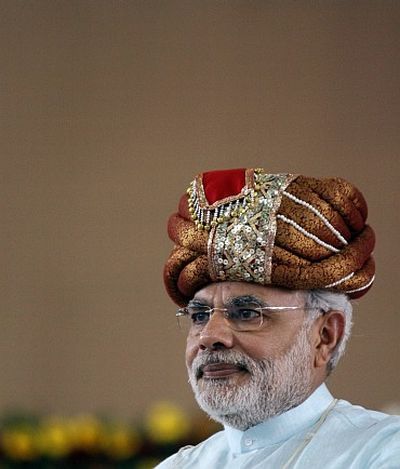 The beleaguered UPA government may provide Narendra Modi all the ammunition he wants. Still, without the politics of persuasion, the BJP’s crowned prince has a daunting task before him, argues Akash Bisht.
The beleaguered UPA government may provide Narendra Modi all the ammunition he wants. Still, without the politics of persuasion, the BJP’s crowned prince has a daunting task before him, argues Akash Bisht.
Hours before Narendra Damodardas Modi was crowned as the Bharatiya Janata Party's prime ministerial candidate for the 2014 election, a group of party workers who gathered at a senior Rashtriya Swayamsevak Sangh leader's home were deeply engrossed in conversation about his elevation.
“His candidature is a mere formality and it’s only L K Advani who has to fall in line. Even if he doesn’t, who cares? His days are well over,” said one BJP worker.
Between their exchanges, they took notice of television news reports of communal violence in Muzaffarnagar, Uttar Pradesh. One of them quipped, “Modi has made it clear that this election would be all about Hindus and Muslims. He would be the face behind which the Hindus of the country unite.”
This ‘vicious communal polarisation’ considered to be a symptom of Modi’s politics, has not only been playing on the minds of many 'secularists', activists and peace-loving citizens, but also on the minds of BJP leaders like L K Advani, Sushma Swaraj and Murli Manohar Joshi who had opposed his candidature, citing how it could hurt the party’s prospects in the assembly elections in Chhattisgarh, Delhi, Madhya Pradesh and Rajasthan this winter.
Ironically, Advani, the man who sowed the seeds of the BJP’s communal agenda back in the late 1980s is losing sleep about Modi’s brand of Hindutva politics.
In this growing clamour for Modi, Advani’s supporters deserted the patriarch one by one and hurriedly cozied to the BJP’s new messiah. Even Swaraj and Joshi toed the party line and were seen sharing the stage and congratulating the newly crowned prince.
If RSS pracharaks are to be believed, Swaraj’s presence must certainly have hurt Advani. It was rumoured that Swaraj persuaded Advani to take the extreme step after the Goa conclave held earlier this year where the BJP appointed Modi as its poll campaign chief.
Such was the clamour for Modi’s candidature that the BJP/RSS turned a blind eye to the requests of other senior leaders, including Madhya Pradesh Chief Minister Shivraj Singh Chauhan who is contesting a third term in his state.
Chauhan reportedly asked the party's central leadership to refrain from making the announcement before the assembly election, but his views were not entertained.
The BJP and RSS leadership believe the time is right to unleash Modi on the national arena and feel his popularity may enthuse BJP workers and voters.
Modi’s ascendance from a tea seller's son to the BJP’s prime ministerial candidate could be trumped up as a miracle of democracy. But it could also turn out to be the darkest day for India’s democracy.
A senior leader of the BJP's former ally, the Janata Dal-United, termed Modi’s elevation as a "bad omen" for the country. The JD-U leader feared that “the nation could be torn on sectarian lines in the days to come.”
In the run-up to the Lok Sabha election, Modi's every move will be viewed with greater public scrutiny.
The ghosts of the 2002 riots and fake encounters in Gujarat are hard to exorcise and the 24X7 national media, which had been kept at bay till now, will certainly seek answers from Modi.
He can no longer maintain his eerie silence on several issues or walk out of television studios when asked uncomfortable questions.
While his brand of communalism and development are well-known, there is no clarity about his perspective on the minorities, foreign policy, Kashmir, AFSPA among several issues.
Known for his autocratic ways, Modi would also have to learn to be more accommodating if he has to make anything of this opportunity presented to him.
His one dimensional, one-upmanship, has always been at the centre of criticism and a major bone of contention between him and the BJP/RSS in the past.
“The RSS is banking on Modi’s popularity and has betrayed its ideology for the sake of power at the Centre," said a senior RSS leader from Gujarat.
"The RSS, which believes in collective organisation work and long-term vision of a Hindu rashtra, has forgotten the humiliation its pracharaks and cadres suffered at the hands of Modi in Gujarat,” the RSS leader added.
Others in the RSS criticise Modi’s so-called development model that only caters to the corporate houses that had pushed his candidature for the 2014 general election.
The RSS’s displeasure over Modi’s brand of economic development is well known and it remains to be seen how the two sides reconcile on these issues.
Political pundits believe the 2014 general election could be a repeat of 1977 when many political forces joined hands to end the cult of Indira Gandhi.
This election could well see secular forces coming together to stop Modi from staking a claim for the top post. With whatever is left of the National Democratic Alliance, the going may be tough for Modi who will have to woo prospective partners if he hopes to make an impact.
The beleaguered United Progressive Alliance government has given him all the ammunition that he wants. But Modi needs to seriously pursue the politics of persuasion if he has any chance of becoming the first OBC prime minister in 2014.
Else, a dark political abyss awaits him.











 © 2025
© 2025